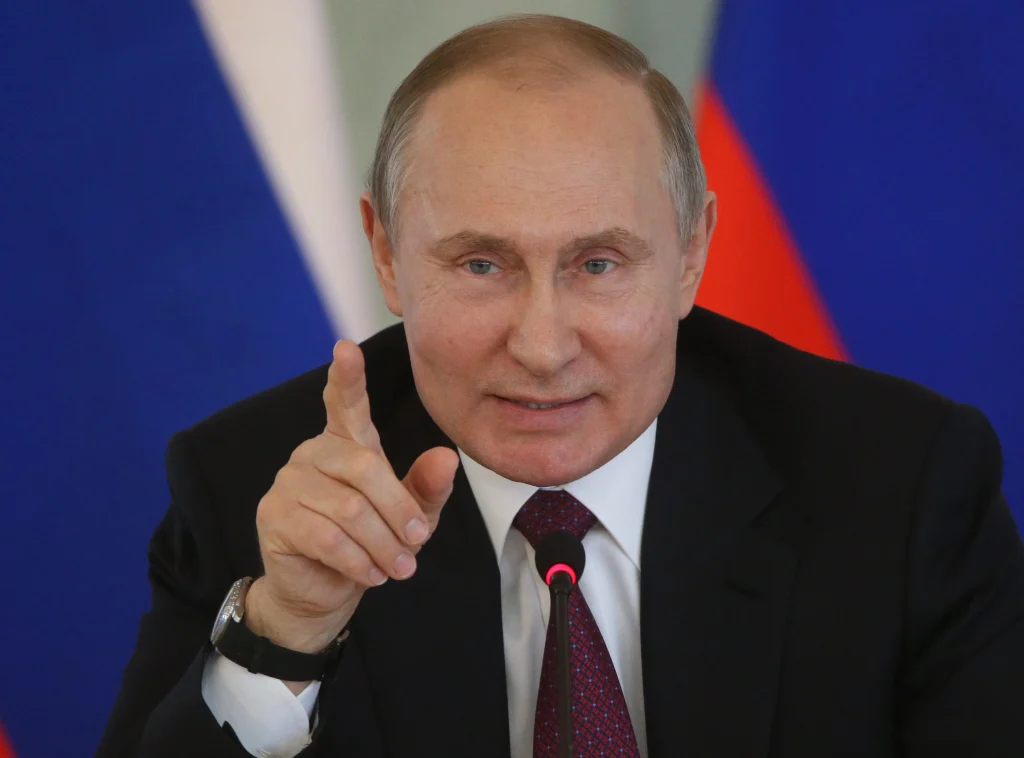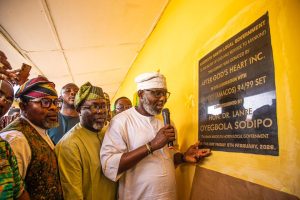
First Vladimir Putin goes to church, puts on the cross, then he kills.
That’s what Archbishop of Cyprus Chrysostomos has said about Putin’s war on Ukraine. He asks: Is this Putin’s orthodoxy?
This war has split the Orthodox Church globally. This is not just a war of politics, it is a holy war.
Vladimir Putin cannot separate Ukraine from the “holy Russ”: the God-given Russian Empire.
Crimea, annexed by Putin in 2014, is the cradle of Russian Christianity where Prince Vladimir — the leader of Kyivan Russ — converted to the faith in the 10th century.
An early Christian community in Crimea dates back to the first century.
In the 19th century, as the West increasingly separated church and state, Russian Tsar Nicolas the first set out his vision of Russian identity with faith at its core: “Orthodoxy, Autocracy, Nationality.”
That remains Putin’s vision today. The church and the state are inseparable. The head of Russian Orthodoxy, Patriarch Kirill, has called Putin “a miracle of God”.
Along with Putin, Patriarch Kirill has revived the idea of “Russian World”. What political scientist Lena Surzhko Harned recently described as a joint mission of church and state, “of making Russia a spiritual, cultural and political centre of civilisation to counter the liberal, secular ideology of the West”.
This holy war is utterly modern
Vladimir Putin believes the West is decadent. He believes the West has turned away from God and he is a defender of the faith.
The man described as “Putin’s brain”, one of the most influential thinkers in modern Russia, Aleksandr Dugin, says the West is the Antichrist.
Is Putin truly a believer? That’s not the question. This is not personal, it is political. This holy war is not medieval, it is utterly modern.
It is about identity in a world in flux. Where faith is turned inward and apart from symbolism or ritual is increasingly pushed out of public debate.
Religion and politics scholar Jocelyne Cesari has traced the evolution of secular modernity in her book, We God’s People. We have now reached a point in Western Europe, she says, where “this world is all there is”.
There is a division between the immanent and the transcendent — between what is Caesar’s and what is God’s. The immanent is the realm of politics.
Believers, Cesari says, “are expected to keep the transcendent to themselves”. She says the nation is now “the superior collective identification” overtaking “religious allegiances”.
In his book, A Secular Age, philosopher Charles Taylor says: “Modern civilisation cannot but bring about a death of God.”
Taylor says we have seen the rise of an “exclusive humanism”. We have swapped God for a “culture of authenticity, or expressive individualism, in which people are encouraged to find their own way, discover their own fulfilment, ‘do their own thing’.”
German philosopher Max Scheler also wrote about this — how we risk becoming alienated from one another, isolated from the world “degraded and depersonalised”.
Faith as a weapon
We struggle to deal with faith in our public discourse. When it arises it usually centres around scandal in the church, or abusive priests, or questions of morality and discrimination.
At its worst it reduces everything to facile debate around cartoonish characters like the rugby player Israel Folau and his social media messages about drunkards, fornicators and gays going to hell.
We miss the deeper questions of how faith can still shape our world and — when misused or exploited — can have devastating consequences.
Cesari says religion survives in the nation state. If nations are “imagined communities”, they don’t arise from nothing.
Religion can be used as the “foundation of identity”. She cites political Islam as an example of how faith can emerge as “a modern technique of governmentality”.
The Islamic world has adopted — or had forced upon them — Western notions of the modern state but faith remains critical to public life and identity.
Radical Islam takes it even further, striking back at the West. Osama bin Laden’s September 11 terrorist attacks on the United States shook the West from its complacency that the world had moved on from wars of religion.
Putin in his own way is not so different to Osama bin Laden, someone for whom faith was a weapon.
As bin Laden cited the 11th century Crusades and Putin seeks a return to the 10th century idea of holy Russia, both have reacted to a modern world. Both products of it, both seeking to remake it.
As bin Laden glamorised warfare and was often photographed with a gun, so Putin has glorified Russia’s history of war and its symbols of military might.
Again, the church is central. Russian Orthodox priests bless nuclear weapons.
Russian Orthodoxy has its own version of jihad, what is called podvig — a spiritual struggle. As Cesari says, podvig defines wars that took place in Russia from the 1300s to World War II and the wars in Chechnya.
Religion as identity can be deadly
In 2020, Patriarch Kirill celebrated liturgy in a new cathedral of the Russian Armed Forces in Moscow. It is one of the tallest cathedrals in Russia. Built in the military themed Patriot Park, the cathedral is adorned with images of weapons and celebrates Russian wars. It has been criticised for being less of an altar to Christ and more a “cult of victory”.
While hundreds of priests have signed a letter protesting the brutality in Ukraine, Patriarch Kirill sees Putin’s war as a “crusade”.
He talks about the “kingdom and the priesthood” what he calls a “symphonic conjugation of the Church and State”.
Patriarch Kirill is, like Putin, a defender of “traditional values”. He has supported Putin’s crackdown on homosexuality and Western cultural influences.
The West is an enemy that, as Cesari argues, “serves the national identity”. Its aim is to oppose the “Western imperialist project”. Again Cesari says there are echoes of radical Islam and its call to global arms:
“Putin calls upon all Christians beyond Russia in ways that echo the call of Islamic radical groups to join the combatant Ummah.”
It is not possible to understand the war in Ukraine without understanding the way faith is weaponised. Whether it be Vladimir Putin, Osama bin Laden, Islamic State or Christian white nationalist terrorism, religion as an identity can exert a deadly hold.
The secular West needs to also examine the way it has diminished, even mocked faith. It has relegated faith to the realm of the personal and creates a political and spiritual void that others seek to exploit.
Western mainstream media, which rarely discusses religion, presents the world too often in Manichean — good and evil — terms that fail to see how modern holy wars are a product of and reaction against secularism itself.
Putin’s holy war violates the great teachings of faith: peace, humility, mercy, forgiveness.
Victor Hugo wrote: “For six thousand years war has pleased the quarrelling peoples and God has wasted his time making the stars and the flowers.”
Perhaps he was wrong. God is often found at the head of armies.




电报是您获取官方信息的最佳来源。了解其安全特性、多平台支持以及如何开始使用。立即访问!